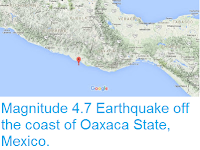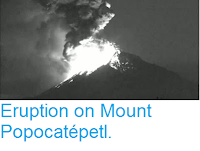Mount Colima, a stratovolcano (cone shaped volcano made up of layers of
ash and lava)
in southern Mexico which gives its name to both the state of Colima and
the Colima Volcanic Complex, erupted twice on Saturday 24 December 2016, with the largest eruption producing an ash
column that rose 2.5 km above the summit of the mountain. Colima is one of
Mexico's most active volcanoes, having erupted more than
40 times since records began in the area in 1576. It has been erupting
more-or-less continuously since 2001, with the current bout of eruptions
having begun about two week ago.
Ash column over Volcán de Colima on 24 December 2016. BBC.
The
volcanoes of the Trans-Mexican Volcanic Belt (including Volcán de
Colima) are fuelled by the subduction of the Cocos Plate beneath the
North American Plate along the Middle American Trench to the south of
Mexico. As the subducting plate sinks into the Earth it is melted by the
heat and pressure, and volatile minerals liquefy and rise through the
overlying North American Plate as magma, fuelling Mexico's volcanoes.
The subduction of the Cocos Plate beneath the North American Plate in Mexico, and how it leads to volcanoes and Earthquakes. King Saud University.
See also...








